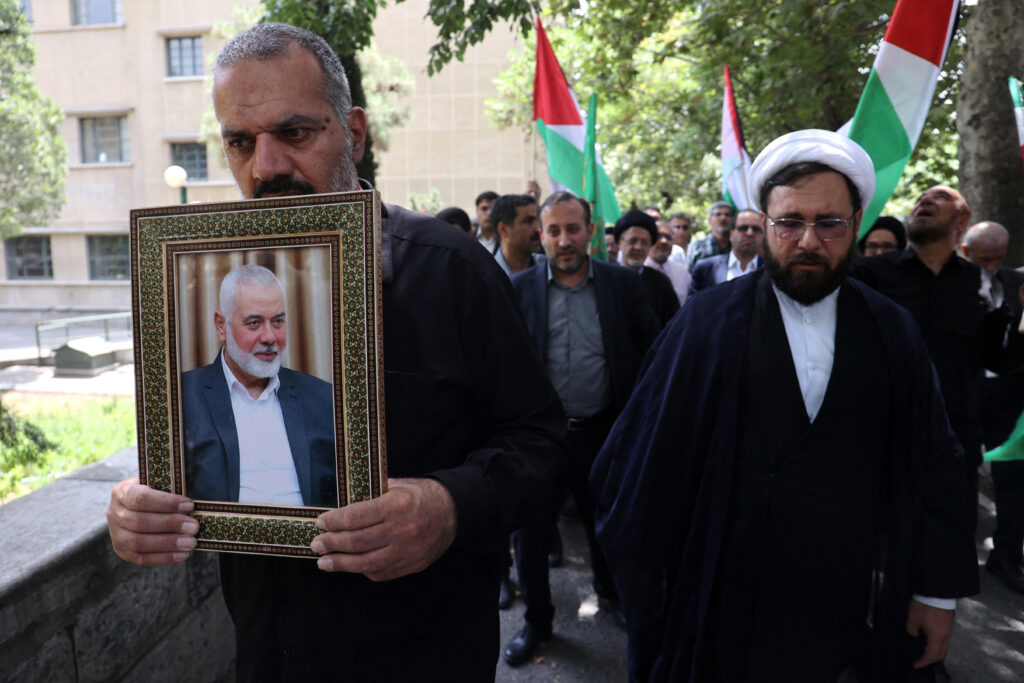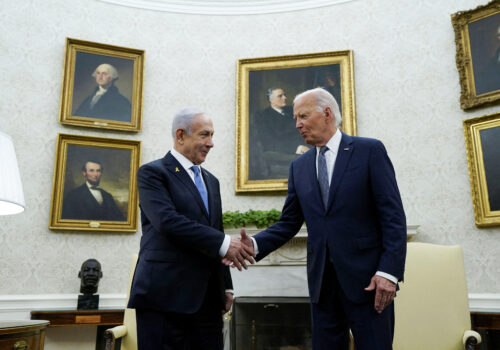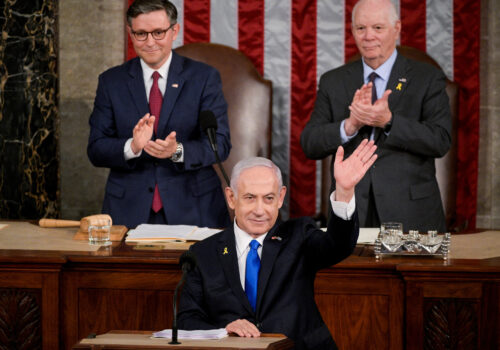
Will the killings of Hamas and Hezbollah leaders lead to a wider war?

GET UP TO SPEED
Two days, two earth-shaking strikes. This morning, an air strike killed Hamas political leader Ismail Haniyeh in Tehran, one day after a rocket strike killed Hezbollah commander Fouad Shukur in Beirut. Israel reportedly launched both strikes as it continues its response to Hamas’s terrorist attack on October 7, 2023, and an apparent Hezbollah attack that killed a dozen children in the Israel-controlled Golan Heights last week. Following Haniyeh’s death, Iran’s supreme leader, Ayatollah Ali Khamenei, said that “it is our duty to take revenge.” Is a wider war next? And how will these events affect the ongoing war in Gaza? Our experts explain below.
TODAY’S EXPERT REACTION BROUGHT TO YOU BY
- Jonathan Panikoff (@jpanikoff): Director of the Scowcroft Middle East Security Initiative at the Atlantic Council’s Middle East Programs and a former US deputy national intelligence officer for the Near East
- Beth Sanner: Member of the Atlantic Council’s Iran Strategy Project advisory committee and a former US deputy director of national intelligence for mission integration
- Ahmed F. Alkhatib (@afalkhatib): Nonresident senior fellow with the Scowcroft Middle East Security Initiative and an American writer and analyst who grew up in Gaza City
Behind the attacks
- “In a matter of twenty-four hours, Israel killed not one but two of the most senior officials in the so-called ‘Axis of Resistance,’” Jonathan tells us. It is Israel’s “most impactful day of tactical successes in months.” But, he adds, “tactical success does not always beget strategic victory, and Israel’s short- and long-term strategy remains unclear.”
- Beth says the “audacious strike” on Haniyeh is part of Israeli Prime Minister Benjamin Netanyahu’s aim of “decapitating Hamas’s leadership.” But “more importantly, it clearly establishes, following Iran’s retaliatory strike on Israel and Israel’s counterstrike inside Iran, the new normal of direct strikes between Israel and Iran.”
- Qatar’s prime minister, who has been mediating negotiations between Israel and Hamas, denounced the “assassination” of the Qatar-based Haniyeh. Ahmed believes that “Israel could have killed Haniyeh months ago, but didn’t want to compromise the relationship with Qatar.” But when Haniyeh traveled to Iran, “which is known to be compromised by Israeli intelligence assets,” Ahmed notes, “opportunity presented itself to take him out.”
Subscribe to Fast Thinking email alerts
Sign up to receive rapid insight in your inbox from Atlantic Council experts on global events as they unfold.

-
-
This field is for validation purposes and should be left unchanged.
Implications for Gaza
- Haniyeh was one of the primary negotiators for Hamas, Jonathan notes. His assassination “does not mean the chances of a hostage release and temporary ceasefire are over, but they will almost certainly be delayed—again.” More important, he adds, is that the ultimate decision on any hostage deal and ceasefire rests with Yahya Sinwar, Hamas’s leader in Gaza and the mastermind behind the October 7 terrorist attack. “That reality does not change because of the assassination.”
- Ahmed expects the killing to exacerbate rifts between Hamas’s political and military wings. “The group’s political wing may view this event as a monumental shift that necessitates ending the war quickly to ensure the continuity of Hamas’s political relevance,” he tells us. But Haniyeh had “limited” influence over Sinwar—acting as “a mere messenger” during negotiations.
The view from Tehran
- “Iran’s failure to prevent this will rightfully terrify the regime, but also force it to respond in some way,” Beth says. The statement from Iran’s mission to the United Nations that Tehran will respond with “special operations,” she says, “suggests that we will not see a missile attack on Israel as we did in April.”
- For Haniyeh to be killed on Iranian soil just after attending the inauguration of Iranian President Masoud Pezeshkian is “a huge, humiliating blow to the Islamic Republic’s prowess and prestige,” Ahmed tells us. Expect a “dramatic” response from the Islamic Revolutionary Guard Corps (IRGC), but not “an all-out confrontation with Israel,” Ahmed adds, as Tehran will “attempt to restore its deterrence capability, fearing that its people and regional proxies will start doubting the country’s power.”
- Pezeshkian “was viewed as the ‘reformist’ in the election and lacks the depth of ties to Iran’s security establishment and IRGC that some of the other candidates had,” Jonathan notes. While the supreme leader will decide any response, he adds, Pezeshkian may decide that “he needs to align with whatever response the IRGC prefers or risk diminished standing and immediate tensions with one of the most important power bases in the Iranian government.”
What to look for next
- Israel’s strike, which Beth notes may have come “without the full blessing, or even foreknowledge, of the United States,” could have “long-term implications” for the two countries’ relationship. “But for now, the question is whether Israel has calibrated correctly in deterring Iran and its proxies or if it has set off an escalatory cycle.”
- The fastest escalation, Ahmed says, is likely to come between Hezbollah and Israel. “While escalation on multiple fronts is inevitable,” he adds, “all players will be carefully assessing their options and avoiding risky moves that greatly destabilize their power, gains, and positions.”
- Jonathan reminds us that Iran “always prioritizes regime stability above everything else.” In this case, that means Tehran “might see the timing and targets of the assassination as an opportunity to claim retaliation while foisting the actual kinetic response off on Hezbollah and Hamas,” Jonathan says. “Iran’s, Hezbollah’s, and Hamas’s responses will drive the direction of the Middle East for the coming weeks and months.”
Further reading
Mon, Jul 8, 2024
Is Iran an ideological state?
Issue Brief By Mahmood Sariolghalam
Mahmood Sariolghalam argues that Islamic fundamentalism did motivate Iran’s international presence in the first decade of the revolution. However, after the death of its founder, Ayatollah Khomeini, the country’s foreign policy now prioritizes policies to guarantee its political survival.
Fri, Jul 26, 2024
Netanyahu comes to Washington on a ‘wing’ and a prayer
MENASource By Shalom Lipner
In his face-to-face encounter with President Joe Biden, Israeli PM Benjamin Netanyahu had a pivotal opportunity to synchronize Israeli and American objectives for the remaining six months of the Biden presidency.
Wed, Jul 24, 2024
Experts react: What Netanyahu’s address to Congress reveals about the state of US-Israel relations
New Atlanticist By Atlantic Council experts
Our experts break down Israeli Prime Minister Benjamin Netanyahu’s speech and what it says about his approach to relations with the United States and to Israel’s war in Gaza.
Image: An Iranian man holds a picture of Palestinian group Hamas’ top leader Ismail Haniyeh, following the killing of him, amid the ongoing conflict between Israel and Hamas, in Tehran, Iran July 31, 2024. Majid Asgaripour/WANA





